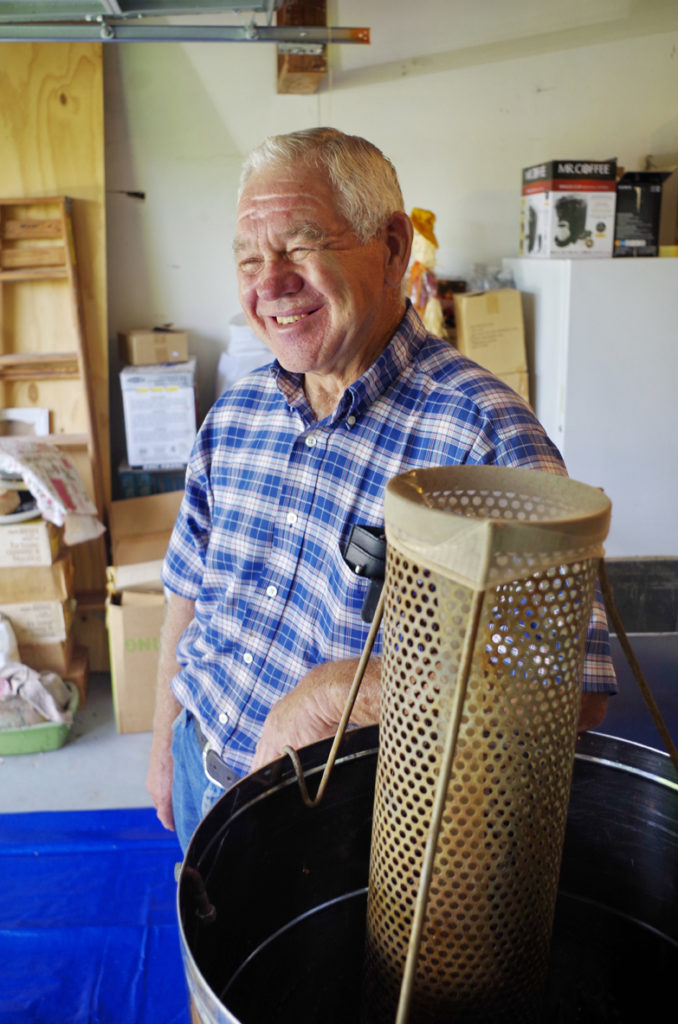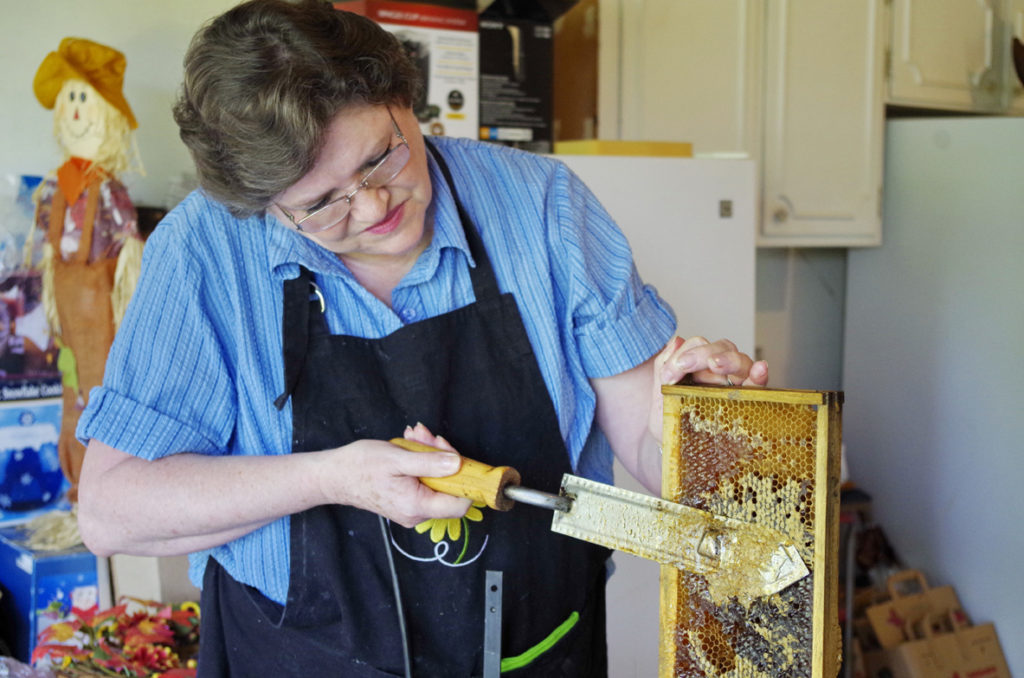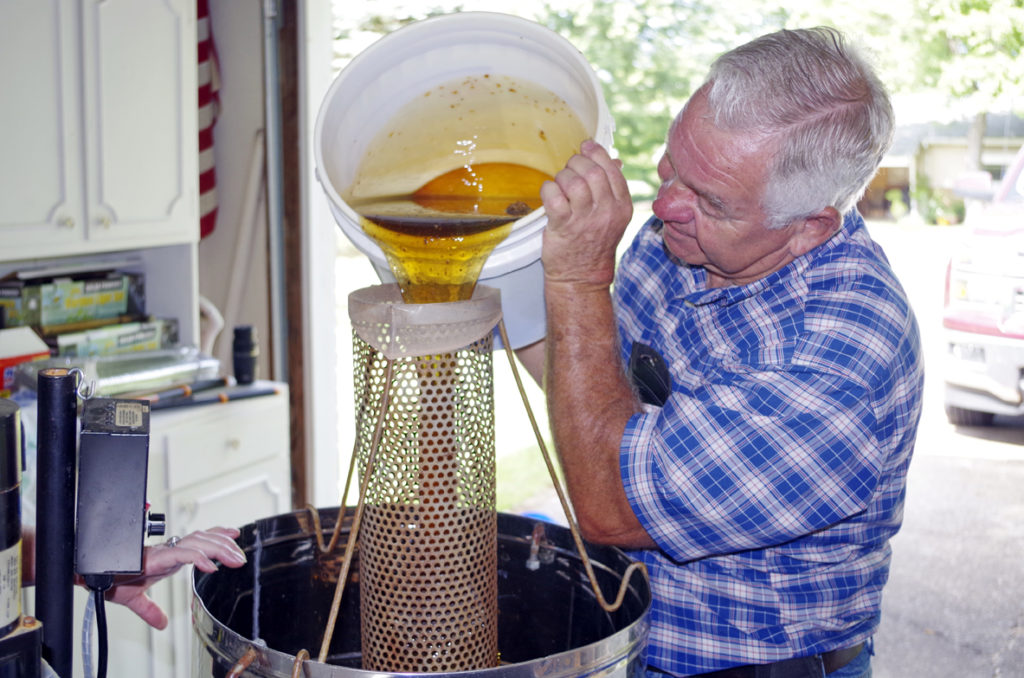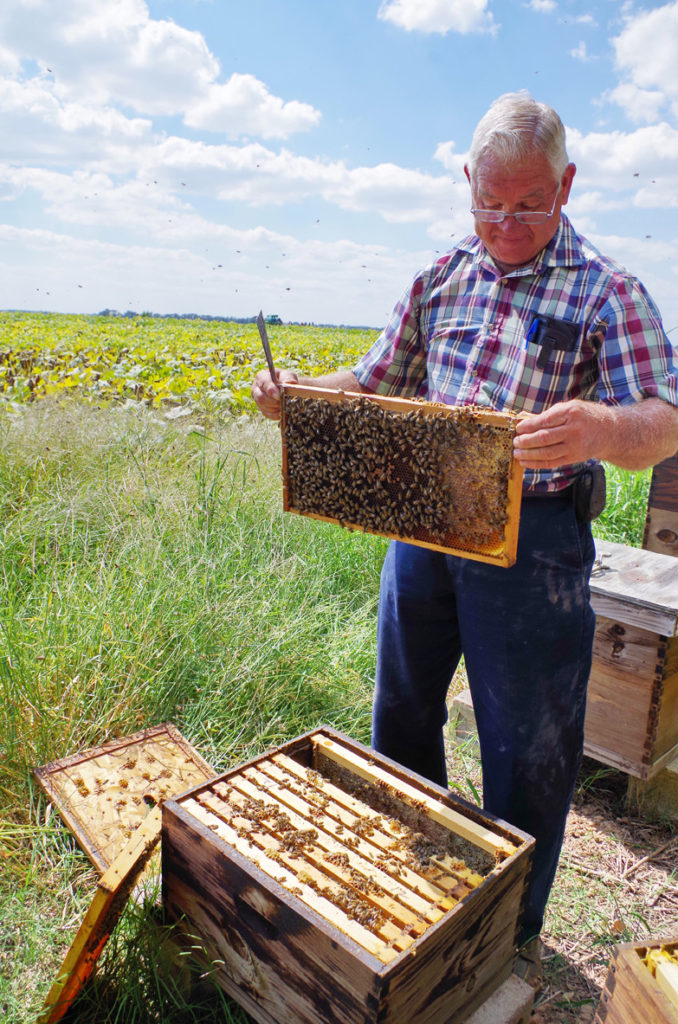by Keith Sutton, Arkansas Farm Bureau
Should you have the opportunity to meet James Rhein of Mountain Home, two things are certain: you’ll laugh, and you’ll learn lots of interesting things about honeybees.
This jovial 75-year-old Baxter County beekeeper is constantly joking with the people around him. But when James is not keeping you in stitches with his one-liners, he’ll amaze you with a constant stream of fascinating facts about America’s favorite pollinators.
“The average bee hive contains 50,000 to 60,000 worker bees, 200 to 500 drone bees and one queen,” he tells me while visiting Baxter County to see his hives. “The average life span of a worker bee is only six weeks, but a queen in the wild might live five to six years. During warm months, the queen lays 1,000 to 2,000 eggs each day.”

They don’t call him The Bee Man for nothing. James Rhein became a beekeeper some 40 years ago and now spends
hundreds of hours each year teaching others how to enjoy the pastime, too.
He drones on about bees (pun intended) throughout our visit, sharing a deep-seated interest in these important insects that developed almost 40 years ago.
“It started with a friend who kept honeybees,” he says. “He kept telling me I should get bees, too, and when I did, I got really interested in them. Unfortunately, back then, there were few local beekeepers, no beekeeping clubs and no beekeeping classes, so I had to teach myself about bees by reading books and through trial and error.”
Perhaps it’s this experience — having to learn beekeeping on his own — that led Rhein on a path to teaching others. Every day he answers several cellphone calls from people needing assistance. He teaches several beekeeping classes annually, a service for which he never charges. And he does all this while keeping 40 to 50 bee hives himself and being active in his church, the local Farm Bureau and other organizations. He served seven years as president of the Arkansas Beekeepers Association, 11 years as president of Baxter County Farm Bureau and 10 years as a state board member for Arkansas Farm Bureau.
 Linda Rhein uses a special heated tool to remove wax caps sealing honey cells in a comb. The bees raised by Linda and her husband James produce hundreds of quarts of Rhein’s Golden Treasure honey each year.
Linda Rhein uses a special heated tool to remove wax caps sealing honey cells in a comb. The bees raised by Linda and her husband James produce hundreds of quarts of Rhein’s Golden Treasure honey each year.
“People call me from all over the state for advice,” he says. “They don’t always understand what’s going on with their bees, and they need a source to go to. I think the best information is from a beekeeper, not on the internet. So I help them all as best I can.
James maintains his hives in Mountain Home. “We don’t sell our honey from a roadside stand or farmers market,” James says. “We sell mostly to people who have bought honey from us for years. We have no trouble selling all we can produce — hundreds of quarts each year.”

James Rhein strains raw honey to remove tiny bits of wax and other debris. The finished honey is then ready to be placed in jars for sale.
Come summer, many of the hives are moved to crop fields in Delta counties where the bees help pollinate everything from pumpkins to cotton and soybeans.
“Everyone knows bees are important, because they give us honey,” James says. “But many don’t realize bees’ primary importance is pollination. Without pollination, we wouldn’t have a third of the food we have today. Many plants can’t reproduce without pollination, and while there are other pollinators out there, too, honeybees are the best. If we were to lose our honeybees, we’d lose much of our food and fiber, everything from soybeans and cotton to fruits and vegetables like blackberries, blueberries, squash and tomatoes. We’d even have to do without pickles, because bees pollinate the cucumbers we use to make them.
“With problems like colony collapse disorder and habitat loss, we need more bees,” he says. “Ironically, there’s this big interest in bees now, because they’re disappearing. More and more people want to have bees, even though they may never rob the hives of honey, because they want to help. And I want to help them be successful.

Teaching others about honeybees brings great joy to the 75-year-old Rhein, who often leads classes on beekeeping in Mountain Home and Jasper.
“When I work with my bees, I don’t hear anything around me. I’m just there in my own world. It’s relaxing and peaceful. You get engrossed with it. You get involved. I go to my bee hives and before I know it, hours have passed. It’s my relaxation. It’s helped me in important ways.
“If I can help a few other people experience that same joy and relaxation, then all the hours I spend on the phone, teaching classes and showing people my hives will have been worthwhile.”
